Demolition Contractors Hightstown
Best Building Demolition in Hightstown
Get up to 3 Building Demolition quotes for your project today! Compare profiles, reviews, accreditations, portfolio, etc... and choose the best deal.
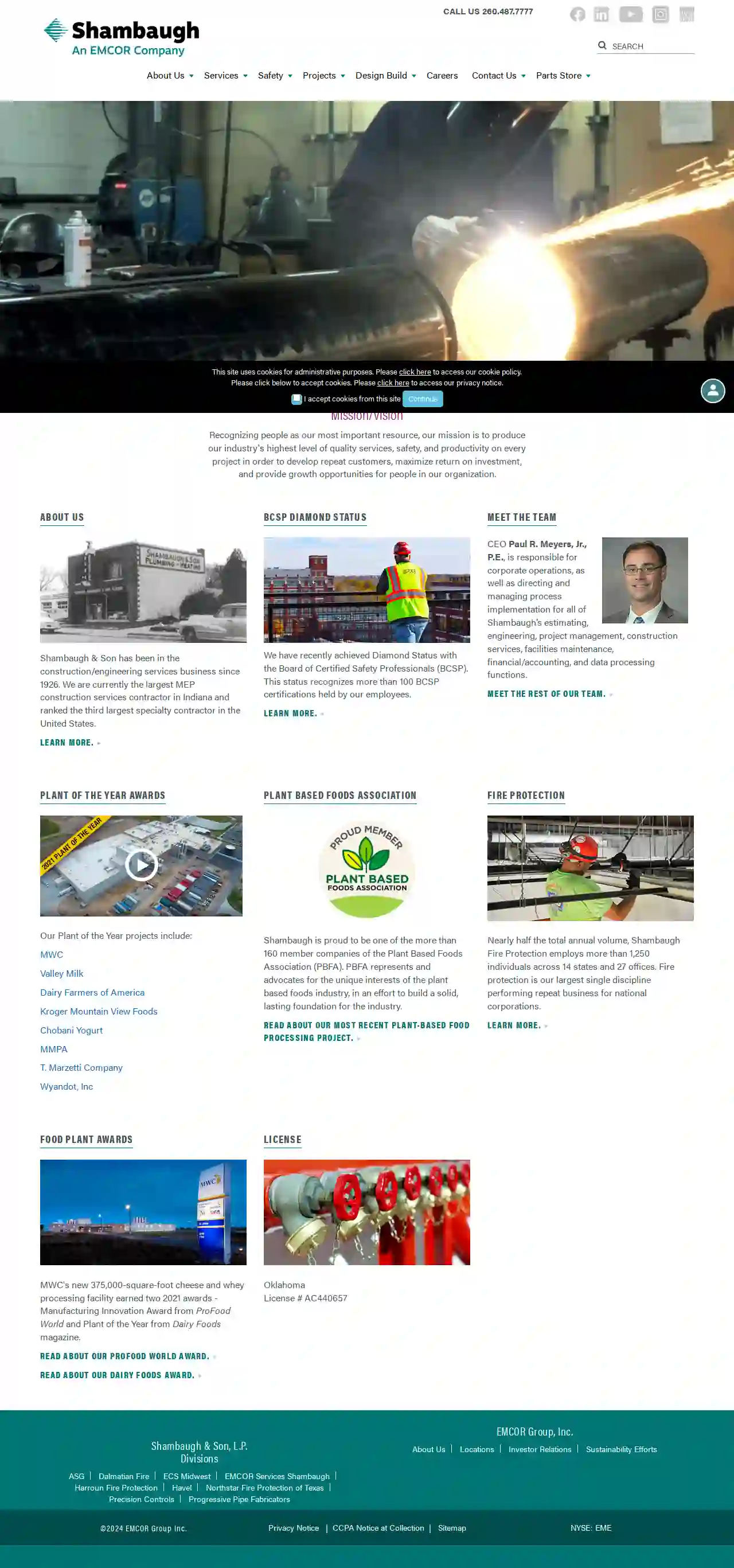
Shambaugh & Son, L.P.
4.287 reviewsWayne, USMission/Vision Recognizing people as our most important resource, our mission is to produce our industry's highest level of quality services, safety, and productivity on every project in order to develop repeat customers, maximize return on investment, and provide growth opportunities for people in our organization. About Us Shambaugh & Son has been in the construction/engineering services business since 1926. We are currently the largest MEP construction services contractor in Indiana and ranked the third largest specialty contractor in the United States. BCSP Diamond Status We have recently achieved Diamond Status with the Board of Certified Safety Professionals (BCSP). This status recognizes more than 100 BCSP certifications held by our employees. Meet the Team CEO Paul R. Meyers, Jr., P.E., is responsible for corporate operations, as well as directing and managing process implementation for all of Shambaugh’s estimating, engineering, project management, construction services, facilities maintenance, financial/accounting, and data processing functions. Plant of the Year awards Our Plant of the Year projects include: MWC Valley Milk Dairy Farmers of America Kroger Mountain View Foods Chobani Yogurt MMPA T. Marzetti Company Wyandot, Inc plant Based foods association Shambaugh is proud to be one of the more than 160 member companies of the Plant Based Foods Association (PBFA). PBFA represents and advocates for the unique interests of the plant based foods industry, in an effort to build a solid, lasting foundation for the industry. fire protection Nearly half the total annual volume, Shambaugh Fire Protection employs more than 1,250 individuals across 14 states and 27 offices. Fire protection is our largest single discipline performing repeat business for national corporations. Food Plant Awards MWC's new 375,000-square-foot cheese and whey processing facility earned two 2021 awards - Manufacturing Innovation Award from ProFood World and Plant of the Year from Dairy Foods magazine. LICENSE Oklahoma License # AC440657 Shambaugh & Son, L.P. Divisions ASG Dalmatian Fire ECS Midwest EMCOR Services Shambaugh Harroun Fire Protection Havel Northstar Fire Protection of Texas Precision Controls Progressive Pipe Fabricators EMCOR Group, Inc.
- Services
- Why Us?
- Our Team
- Gallery
Get Quote
Fox Contractors Corp
4.618 reviews5430 W. Ferguson Road, Fort Wayne, 46809, USWe can dig it. To get a job done right, you need to start with someone who really knows what they’re doing. That’s Fox Contractors. Decades of laying the groundwork Since 1948, we’ve been behind projects in and around Indiana that require specialized support with earthmoving and underground utilities. Our expertise can be found on jobs that range from heavy highway and public works to commercial and industrial site development. View Our Certifications Minority Business Enterprise Indiana Veteran Owned Small Business Enterprise Veteran Owned Business After more than 70 years in business, we’ve built a reputation for impeccable work that’s done on time and on budget. That, along with our fair pricing and highly skilled, safety-conscious workforce make us the first choice for project managers who are looking for a reliable partner. Our clients include DOTs, municipalities, general contractors and developers, and we have experience in the healthcare, education and environmental fields. Fox Contractors is proud to be a certified Minority Business Enterprise (MBE) and a 100% signatory contractor with the IUOE, Teamsters and Laborers’ unions. With a headquarters in Fort Wayne and a regional office near Indianapolis, Fox Contractors serves customers across the region and is prequalified with the Indiana, Michigan and Ohio Departments of Transportation. We take care of business – from the ground up. ”Fox places a high value on safety because our people are our #1 asset. We strive to minimize or eliminate hazards all together, so that all employees can work in a safe environment, without losing time. Our safety-first approach is reflected in our extensive training and education, as well as an employee safety commitment that starts from the top down.” Dallas Day, Owner, Fox Contractors Corp.
- Services
- Why Us?
- Testimonials
- Gallery
Get Quote
PACE Excavating LLC.
4.922 reviews80 Payne Field Rd, West Point, 39773, USThe PACE Story PACE Excavating was formed as an LLC in 2011 by Seth Wedel and Troy Jantz. As teenagers in the '80s, both learned dirt construction alongside their fathers, Galen Wedel and Ronnie Jantz. Both families had been farmers and after a change in market conditions needed to find another way to make a livelihood. The Wedel’s started their operation by pulling a small dirt pan home from the Mississippi Delta behind a single-cab pickup truck. Holding customer satisfaction as a top priority and dedication to learning and growing became the foundations of both families operations. Brothers Shannon Wedel and Gabriel Wedel soon joined the Wedel’s operation to create a strong family business. Over the years the two teams often worked side by side, subcontracting together. Many long hours working all across Mississippi and into Arkansas, Alabama and Tennessee gave them a wealth of experience and knowledge. Working with a large variety of contractors and all kinds of projects from roads to subdivision and site development to ponds and landfills, this team has become unparalleled in their knowledge of dirt and different soils and how to put it where you want it! When Seth and Troy made the decision to join forces, more than 75 years of combined experience came together. Third generation Carson Wedel joined the team soon after. The families enjoyed working together and anticipation of many years creating together. That dream changed directions when Troy lost an earthly battle with cancer and became the company’s heavenly partner at age 40. The company proudly carries his choice of name PACE Excavating. Our motto continues to be P-A-C-E. Pace Projects Completed Safe Days of Operation Achieve We are proud to be a strong team creating strong culture that offers you the highest level of service. Create Next Steps.... Give us a call today. We will be glad to get you a quote or answer questions you have. Excel Get a Quote
- Services
- Why Us?
- Our Team
- Gallery
Get Quote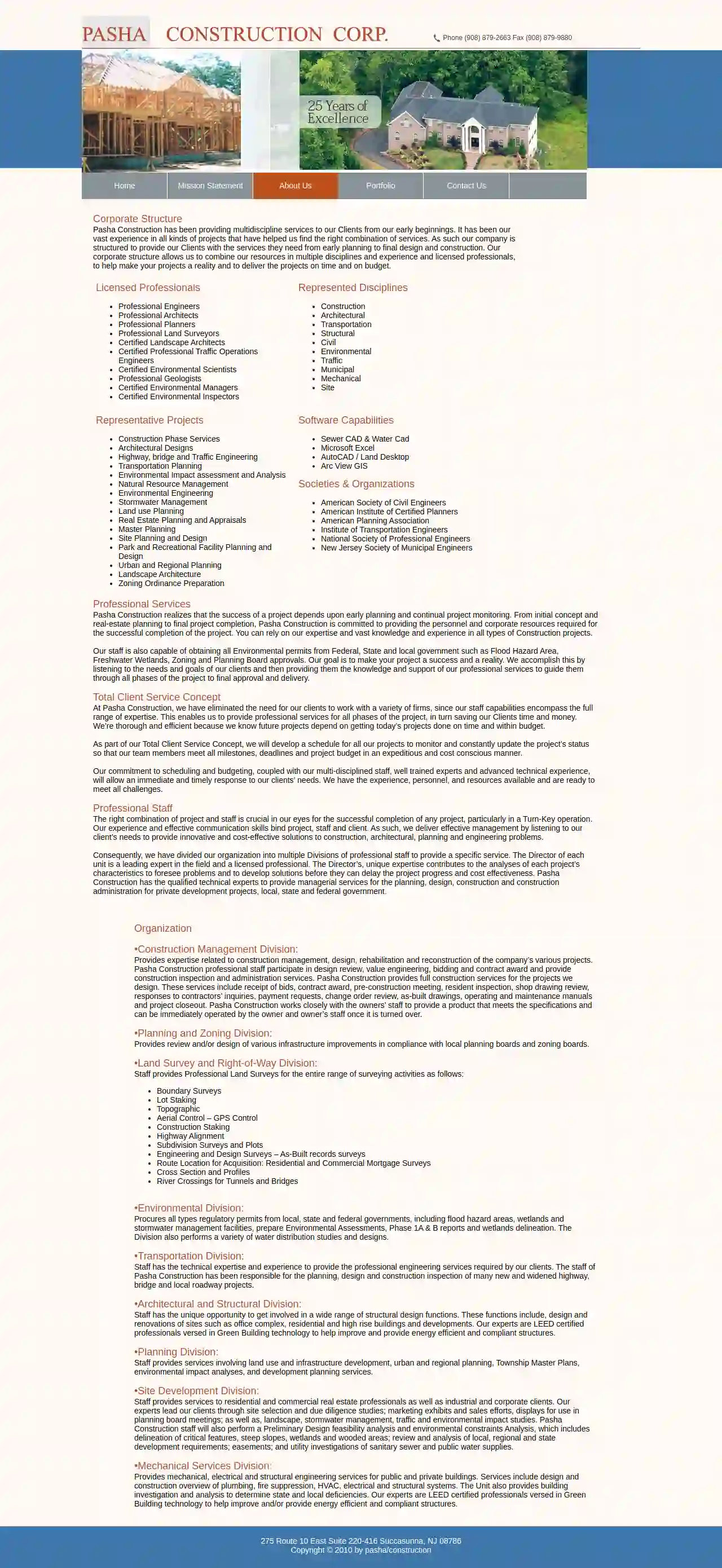
Pasha Construction
275 Route 10 East Suite 220-416, Succasunna, 08786, USAbout Us Pasha Construction has been providing multidiscipline services to our Clients from our early beginnings. It has been our vast experience in all kinds of projects that have helped us find the right combination of services. As such our company is structured to provide our Clients with the services they need from early planning to final design and construction. Our corporate structure allows us to combine our resources in multiple disciplines and experience and licensed professionals, to help make your projects a reality and to deliver the projects on time and on budget. Licensed Professionals Professional Engineers Professional Architects Professional Planners Professional Land Surveyors Certified Landscape Architects Certified Professional Traffic Operations Engineers Certified Environmental Scientists Professional Geologists Certified Environmental Managers Certified Environmental Inspectors Represented Disciplines Construction Architectural Transportation Structural Civil Environmental Traffic Municipal Mechanical Site Representative Projects Construction Phase Services Architectural Designs Highway, bridge and Traffic Engineering Transportation Planning Environmental Impact assessment and Analysis Natural Resource Management Environmental Engineering Stormwater Management Land use Planning Real Estate Planning and Appraisals Master Planning Site Planning and Design Park and Recreational Facility Planning and Design Urban and Regional Planning Landscape Architecture Zoning Ordinance Preparation Software Capabilities Sewer CAD & Water Cad Microsoft Excel AutoCAD / Land Desktop Arc View GIS Societies & Organizations American Society of Civil Engineers American Institute of Certified Planners American Planning Association Institute of Transportation Engineers National Society of Professional Engineers New Jersey Society of Municipal Engineers Professional Services Pasha Construction realizes that the success of a project depends upon early planning and continual project monitoring. From initial concept and real-estate planning to final project completion, Pasha Construction is committed to providing the personnel and corporate resources required for the successful completion of the project. You can rely on our expertise and vast knowledge and experience in all types of Construction projects. Our staff is also capable of obtaining all Environmental permits from Federal, State and local government such as Flood Hazard Area, Freshwater Wetlands, Zoning and Planning Board approvals. Our goal is to make your project a success and a reality. We accomplish this by listening to the needs and goals of our clients and then providing them the knowledge and support of our professional services to guide them through all phases of the project to final approval and delivery. Total Client Service Concept At Pasha Construction, we have eliminated the need for our clients to work with a variety of firms, since our staff capabilities encompass the full range of expertise. This enables us to provide professional services for all phases of the project, in turn saving our Clients time and money. We’re thorough and efficient because we know future projects depend on getting today’s projects done on time and within budget. As part of our Total Client Service Concept, we will develop a schedule for all our projects to monitor and constantly update the project’s status so that our team members meet all milestones, deadlines and project budget in an expeditious and cost conscious manner. Our commitment to scheduling and budgeting, coupled with our multi-disciplined staff, well trained experts and advanced technical experience, will allow an immediate and timely response to our clients’ needs. We have the experience, personnel, and resources available and are ready to meet all challenges.
- Services
- Why Us?
- Gallery
Get Quote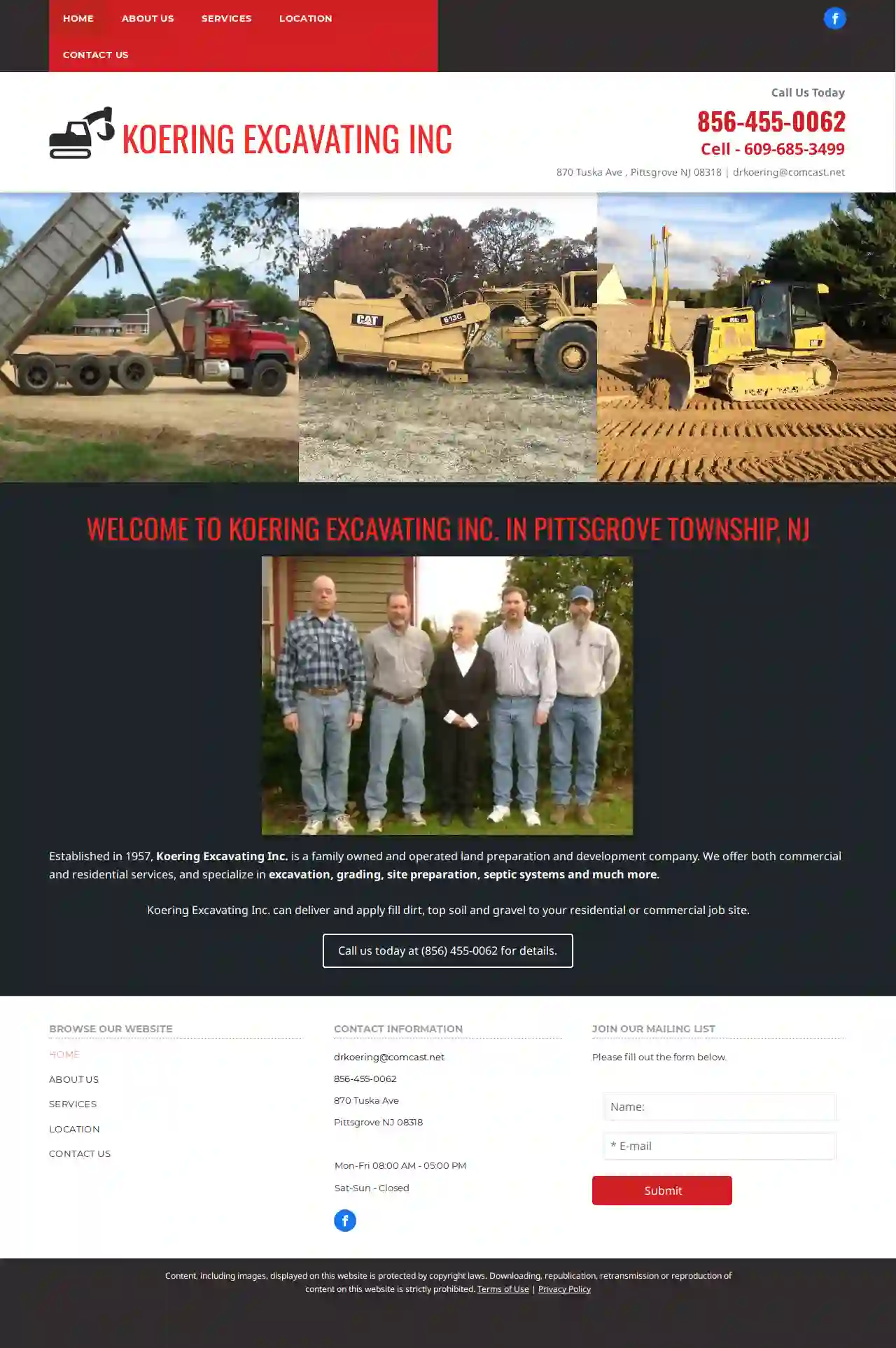
Koering Excavating Inc.
870 Tuska Ave, Pittsgrove, 08318, USAbout Koering Excavating Inc. Established in 1957, Koering Excavating Inc. is a family-owned and operated land preparation and development company. We take pride in our 59 years of service to the greater Pittsgrove Township area. With an eye for detail and our focus on safety, we offer our services to our residential, commercial, and municipal community. We have the industry experience and equipment to get the job done safely and on time the first time. We offer both commercial and residential services, and specialize in excavation, grading, site preparation, septic systems, and much more. Koering Excavating Inc. can deliver and apply fill dirt, top soil, and gravel to your residential or commercial job site. Our Heavy Duty Equipment Includes: Front End Loader Bull Dozier Dump Truck Back Hoe Excavator Plainer
- Services
- Why Us?
- Gallery
Get Quote
Niblock Excavating
11 reviews1751 N US Highway 33, Kimmell, 46760, USFull Service. Family Run. Formidable Capabilities. For over seven decades, Niblock has been delivering top-notch earthwork, underground utility work and paving in Northern Indiana and Southern Michigan. With a crew over 100 strong, we handle all facets of large civil work while offering the efficient communication and personalized service of a family run company. The Niblock Difference Done Right the First Time, Every Time It’s a cliche claim, but no less true. We hold ourselves to the highest standards in all we do. In fact, we’ve actually turned down work when specifications don’t meet our standards. When you choose Niblock, you can count on long term durability. More than Muscle, Experienced Problem-solving Partners With decades of experience, we’ve seen it all. We’re always on the lookout for ways to improve performance and make your application more efficient. We’ve helped clients reroute access and layout for better traffic flow, spotted ways to improve drainage, dramatically expand capacity with minor alterations, and more. Tightly Coordinated, Family Run We pack big capabilities into a small-company feel, enabling us to communicate more efficiently and eliminate approval bottlenecks. You’ll get personalized service and a simple, single point of contact for all of your job needs. On Time and On Budget It seems delays and overruns are standard operating procedure for many, but not at Niblock. We’re experienced and realistic in our projections. We pride ourselves on sticking to our budget and deadline commitments. A Steady History You can Count On For three generations, Niblock has been delivering top-notch work in Northern Indiana and Southern Michigan. We have a stable, long-term track record. When we say we stand by our work, you can be assured we’ll be here to do just that for many years to come.
- Services
- Why Us?
- Gallery
Get Quote
Blackwater Draw Locality 1
4.556 reviews1500 S. Ave K, Lea Hall Room 163, Portales, 88130, USThe Blackwater Draw Museum seeks to foster preservation and education of the heritage of New Mexico, the Southern High Plains, and the greater Southwest through exhibitions, educational programs, collections, and research, while enriching and supporting the educational goals and mission of ENMU. The Blackwater Draw Museum is a small museum located on the campus of Eastern New Mexico University in Portales, New Mexico. The museum is home to a collection of artifacts from the Blackwater Draw National Historic Landmark, a site that has been inhabited by humans for over 13,500 years. The museum offers a variety of exhibits, educational programs, and research opportunities. Visitors can learn about the history of the Blackwater Draw site, the cultures that have lived there, and the archaeology of the region. The museum also has a collection of artifacts from the Casas Grandes culture, a prehistoric culture that flourished in the Southwest from about 1300 to 1450 AD. The museum is open to the public and offers a variety of tours and programs. The museum is a great place to learn about the history and culture of the Southwest. The Blackwater Draw Museum is a great place to learn about the history and culture of the Southwest. The museum offers a variety of exhibits, educational programs, and research opportunities. Visitors can learn about the history of the Blackwater Draw site, the cultures that have lived there, and the archaeology of the region. The museum also has a collection of artifacts from the Casas Grandes culture, a prehistoric culture that flourished in the Southwest from about 1300 to 1450 AD. The museum is open to the public and offers a variety of tours and programs.
- Services
- Why Us?
- Gallery
Get Quote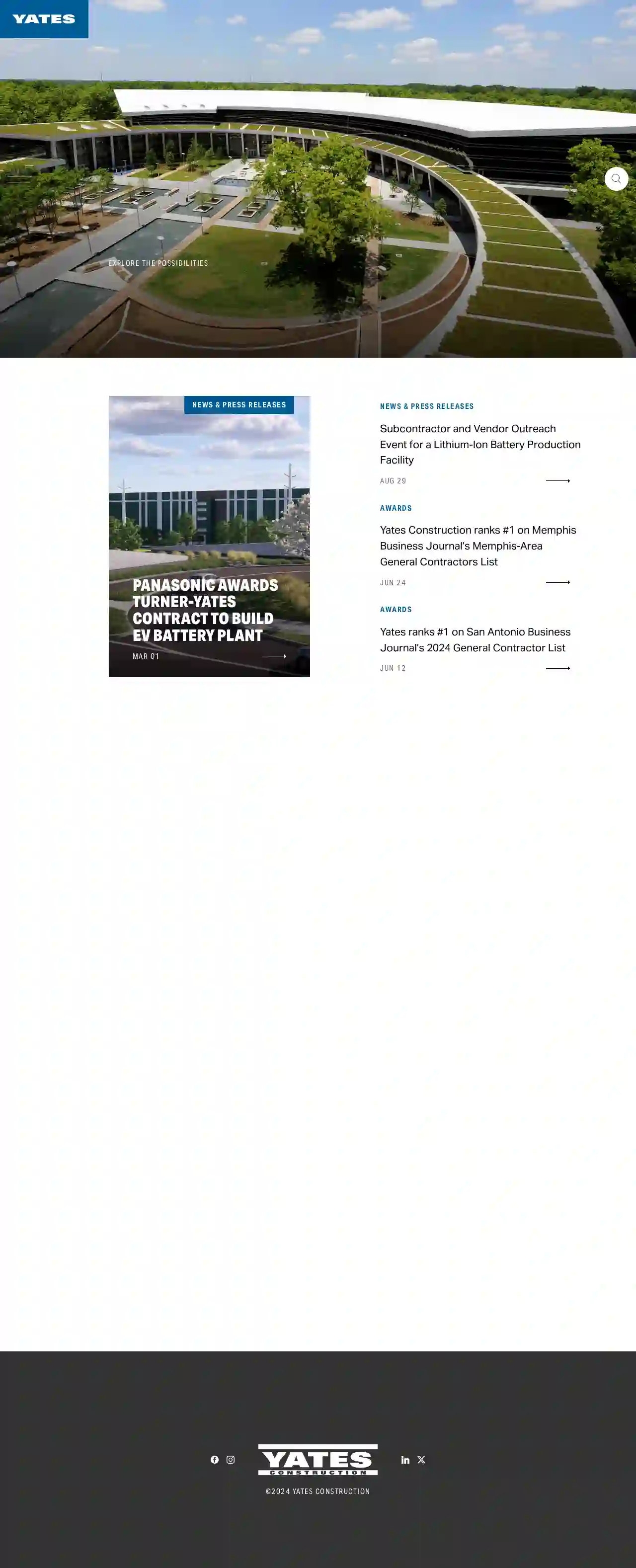
W.G. Yates & Sons Construction Company
4.624 reviews104 Gully Avenue, Philadelphia, MS 39350, 39350, USYates Construction: Building the Future Yates Construction is a leading general contractor specializing in the construction of complex, large-scale projects across the United States. With a rich history spanning decades, we have established a reputation for delivering exceptional results, exceeding client expectations, and fostering lasting relationships. Our Mission Our mission is to provide our clients with the highest quality construction services, delivered on time and within budget. We are committed to safety, integrity, passion, and commitment in everything we do. Our Experience Yates Construction has a proven track record of success in a wide range of market sectors, including: E-Commerce Distribution Facilities Hospitality Gaming Technology Centers Industrial Healthcare Education Government Commercial Our Team Our team of experienced professionals is dedicated to providing our clients with the highest level of service. We are committed to building strong relationships with our clients and subcontractors, and we believe that collaboration is key to success.
- Services
- Why Us?
- Gallery
Get Quote
Jordan Construction, Inc.
539 reviewsPO Box 6242, Vancleave, 39565, USThe Dream Can Be Yours Inground pools are the height of luxury for any homeowner. Adding increased buyer appeal and fun for residents, spas and swimming pools are great features for any client to consider. Just imagine this. Hearing the tranquil sound of water just beyond your door and seeing the gleam of crystal waters in your very own pool? Sound appealing? The dream can be yours. As a licensed construction company, Jordan Construction specializes in installing luxurious swimming pools and spas second to none. Partnered with providers that include Thursday Pools and Imagine Pools, we work hard to transform your outdoor living space into an exotic oasis complete with concrete patio surrounds and an inground pool that will be the envy of the neighborhood! Seeking to incorporate other outdoor enhancements for your home? We can help with driveways, patios, custom decks and much more! Have you always longed for a pool? Part of the benefit of choosing Jordan Construction, Inc. is that we bring years of experience to the field. Through our countless projects we've taken on, we've cultivated our craft to the highest level of precision. We understand that when you hire our team to install a pool, you are seeking a luxurious result and that's exactly what we deliver. Don't believe us? Just take a look at our reviews from happy clients. Our goal is to not only meet your expectations, but exceed them! What Customers Are Saying... Very highly recommend Jordan Construction! If you are considering installing a pool, you will not find better on the coast than Eddie! He and Kelly will explain every step, cover all the options and ensure you are comfortable with the process. We didn't pay a dollar more than expected, and they were done in exactly 2 weeks as planned. Eddie and his crew are thoughtful, careful and quick! Now we just need some warm weather to heat up our awesome new pool!! -Jennifer Johnson Williams More than pools As we've stated before, we're a full-service construction company that offers more than pool installation. Our custom concrete services entail not only laying grounds for pool installs but we also lay driveways, patios, and even home foundations. Need a new deck? We're on it! Our Office is your Backyard If you live in... MISSISSIPPI: Vancleave, Bay Saint Louis, Biloxi, Diamondhead, D'Iberville, Gautier, Gulfport, Hattiesburg, Long Beach, Moss Point, Ocean Springs, Pascagoula, Wiggins & Picayune
- Services
- Why Us?
- Testimonials
- Gallery
Get Quote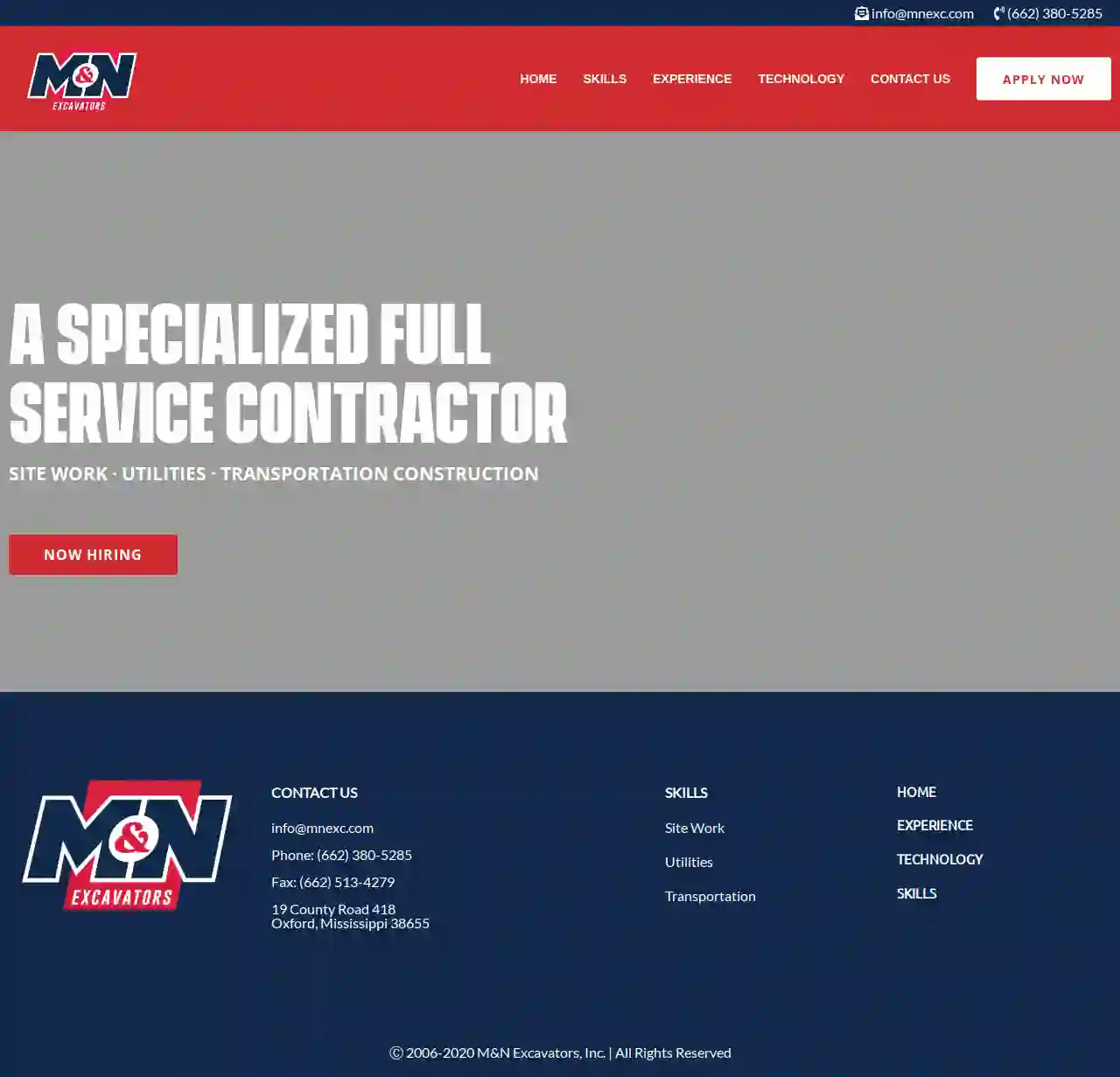
M & N Excavators Inc
4.73 reviews19 County Road 418, Oxford, 38655, USM&N Excavators, Inc. is a specialized full-service contractor specializing in site work, utilities, and transportation construction. We are a team of experienced professionals dedicated to providing our clients with the highest quality services. We are committed to safety, quality, and customer satisfaction. We have a proven track record of success in the industry and are committed to providing our clients with the best possible experience. We are always looking for talented individuals to join our team. If you are interested in a career with M&N Excavators, Inc., please visit our Apply Now page.
- Services
- Why Us?
- Gallery
Get Quote
Over 22,076+ Excavation Pros on our platform
Our excavation contractors operate in Hightstown and surrounding areas!
ExcavationHQ has curated and vetted the Best Excavation Contractors near Hightstown. Find a reliable business today.
Frequently Asked Questions About Demolition Contractors
- Recycling: Concrete, brick, metal, and wood can be recycled and reused in other construction projects, reducing waste sent to landfills.
- Landfill Disposal: Non-recyclable materials are disposed of in designated landfills according to local regulations.
- Donation: Some materials, such as fixtures or appliances, may be suitable for donation to charitable organizations.
- Safety: Experienced contractors have the knowledge, skills, and safety training to execute demolitions safely, minimizing risks to workers and surrounding areas.
- Efficiency: Contractors have the specialized equipment and expertise to complete demolitions efficiently, saving time and reducing project costs.
- Compliance: Reputable contractors are familiar with local regulations and permitting requirements, ensuring compliance and avoiding legal issues.
- Waste Management: Contractors have waste management plans to handle debris responsibly, including recycling and proper disposal.
- Liability Protection: Insured contractors protect you from financial responsibility for accidents or damages during the demolition process.
What happens to the debris after demolition?
Do I need a permit for demolition?
What are the benefits of hiring a professional demolition contractor?
What is asbestos abatement?
What happens to the debris after demolition?
- Recycling: Concrete, brick, metal, and wood can be recycled and reused in other construction projects, reducing waste sent to landfills.
- Landfill Disposal: Non-recyclable materials are disposed of in designated landfills according to local regulations.
- Donation: Some materials, such as fixtures or appliances, may be suitable for donation to charitable organizations.
Do I need a permit for demolition?
What are the benefits of hiring a professional demolition contractor?
- Safety: Experienced contractors have the knowledge, skills, and safety training to execute demolitions safely, minimizing risks to workers and surrounding areas.
- Efficiency: Contractors have the specialized equipment and expertise to complete demolitions efficiently, saving time and reducing project costs.
- Compliance: Reputable contractors are familiar with local regulations and permitting requirements, ensuring compliance and avoiding legal issues.
- Waste Management: Contractors have waste management plans to handle debris responsibly, including recycling and proper disposal.
- Liability Protection: Insured contractors protect you from financial responsibility for accidents or damages during the demolition process.